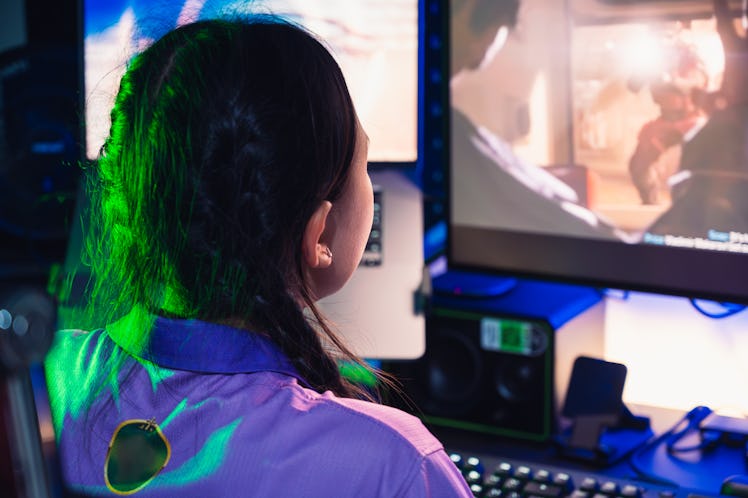Gaming Is Worse Than TV For Kids In One Very Worrisome Way
It’s no secret that screen time before bed can make it harder to fall asleep. Some screen time is more harmful than others.

One of the biggest casualties of teens and screens is lost sleep, a new study has found. But it’s how teens choose to spend that screen time that matters. Engaging in interactive screen time — such as playing video games or texting with friends — significantly increases the time it takes for teens to fall asleep at night. In the study, teens reported spending five hours a day on screens and, on average, got 7.8 hours of sleep a night, less than the 8 to 12 hours recommended.
The study, published in the Journal of Adolescent Health, found that teens aged 15 who gamed or texted in the hour before bed took 30 minutes longer to fall asleep. And for every hour beyond their usual interactive screen time during the day, teens took about 10 minutes longer to fall asleep. That might not sound like much, but those minutes add up.
“If teens typically play video games for an hour each day, but one day a new game comes out, and they play for four hours, that's three additional hours more than they typically play,” lead study author David Reichenberger, Ph.D., a postdoctoral scholar at Penn State, said in a press release. “So, that means they could have 15 minutes of delayed sleep timing that night.”
When kids have to be up at a certain time in the morning for activities such as school, they can’t make up for falling asleep later by sleeping in, so they get less total sleep, which is harmful to their health. One study published in 2022, for example, found that kids between the ages of 6 and 12 who get less than nine hours of sleep every night “can have impaired cognitive wellbeing, including less memory, problem-solving, and rational decision-making abilities than their peers who sleep more.” And despite needing about 8 to 12 hours a night of sleep, most teens don’t get enough sleep and are slammed by early school start times that don’t align with their natural circadian rhythms.
“Without adequate sleep, kids are at increased risk of obesity, as well as impaired cognition, emotion regulation, and mental health,” Reichenberger said.
For the study, the research team surveyed 475 teens to determine their daytime screen habits and sleep patterns. They asked participants how many hours per day they spent texting, messaging on social media, using email, playing video games, watching television or videos, and surfing the internet. They also asked if and how often they participated in any of these activities in the hour before bed.
They found that teens spent about two hours a day texting or messaging with friends, about 1.3 hours a day gaming, and about 1.7 hours watching videos or TV.
Activity levels were measured with accelerometers worn on the wrist, allowing the team to determine when teens were most likely asleep. “When the participant is least active, we can infer that they are likely asleep,” Reichenberger explained. “It’s more accurate than asking them how many hours they slept.”
The accelerometers revealed that teens slept on average 7.8 hours each night. Those who reported texting and messaging with friends throughout the day took about 11 minutes longer per hour to fall asleep, and kids who reported gaming during the day took about nine minutes longer to fall asleep. Kids who said they did those things in the hour before bed took an additional 30 minutes to fall asleep.
Interestingly, teens who watched videos or TV or surfed the internet did not experience a delay in sleep onset.
“It could be that these more passive activities are less mentally stimulating than interactive activities like texting and video game-playing,” co-author Anne-Marie Chang, Ph.D., and an associate professor of biobehavioral health at Penn State University, said in the press release.
Though it might be difficult to pry their phones from their hands, parents should consider limiting teens’ phone time in the hour leading up to bed and encourage passive activities like reading or even watching television instead of gaming or texting, if cutting out screens altogether is out of the cards.
This article was originally published on